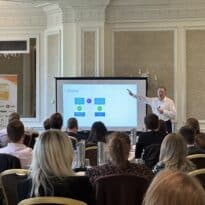Whether you are preparing for your exams, or simply want to keep your knowledge up-to-date, Professional Paraplanner’s Development Zone can help.
Every month, in conjunction with Brand Financial Training, we provide a series of questions from across the syllabus which aim to test your knowledge of the financial services market, as part of your overall self development training goals and exam techniques.
The following questions relate to examinable Tax year 24/25, examinable by the CII until 31 August 2025.
You will find the answers separately under the Development Zone tab on the Professional Paraplanner website.
Questions
1. The Financial Conduct Authority (FCA) is concerned with a person’s ‘close links’ under the threshold conditions within the FCA handbook to
A. establish if the person has any connection or bias.
B. ensure they will not prevent the FCA’s effective supervision of the person.
C. understand any professional connections the firm has.
D. ensure the person/firm has adequate support systems in place.
2. Which of the following best describes a ‘synthetic’ passive fund?
A. An exchange traded fund that uses derivatives to match an index.
B. An index-tracking fund that tracks a specialist index.
C. An exchange traded fund that holds stocks to replicate an index.
D. A socially responsible index-tracking fund.
3. Pippa died in the tax year 2002/2003 using 50% of the then Inheritance Tax nil-rate band of £250,000. If her husband David dies in this tax year his executors could apply for the standard nil rate band to be extended to
A. £650,000.
B. £487,500.
C. £450,000.
D. £325,000.
4. Trustees of an occupational pension scheme could be considered to have committed an offence if they
A. recommend employees join the scheme.
B. give advice on a provider’s personal pension.
C. promote an in-house AVC.
D. criticise, in generic terms, an individual pension.
5. Emily, a higher rate taxpayer, has received the benefits from her critical illness policy after making a valid claim. The benefits she receives will be liable for
A. income Tax at 40%.
B. capital Gains Tax at 24%.
C. income Tax at 20%.
D. no tax of any nature
6. Germany’s main equity index is value-weighted and is the basis of futures and options traded on the Deutsche Borse; it includes reinvested income and is called the
A. NASDAQ.
B. CAC 40.
C. DAX 40.
D. Nikkei 225.
7. The most common form of issuing new shares under an initial public offering or IPO is by
A. an offer for sale.
B. an offer for subscription.
C. a placing.
D. an introduction.
8. Wendy is aged 56 and has substantial savings and pension income. She has her care costs met in full; this is likely to be because
A. she lives in Northern Ireland.
B. she has a dependent husband living in the marital home.
C. she is incapacitated as a result of injuries caused by active military service.
D. her primary need has been identified as continuous healthcare.
9. Dolores, aged 70, is single and owns a property valued at £400,000. She has a good level of pension income, which is index linked. If she takes out a lifetime mortgage for £75,000 and gifts the proceeds to her three nephews and nieces, which tax is she potentially avoiding?
A. Inheritance Tax.
B. Capital Gains Tax.
C. Council Tax.
D. Income Tax.
10. Paula has recently purchased a holiday home within the EU to use as a rental property. She has therefore applied to a UK company which specialises in providing overseas mortgages. Paula should bear in mind that the exchange of contracts
A. will not be binding until the funds are released.
B. has to have taken place before the loan will be agreed.
C. may take place on the same date the sale completes.
D. will trigger a liability to Stamp Duty Land Tax.






























